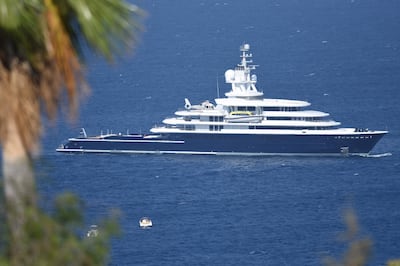The owner of a $540 million superyacht impounded at Dubai’s Port Rashid during a complex matrimonial dispute will challenge an order to freeze the asset at a DIFC Courts hearing today, raising questions over the exact remit and powers of the emirate’s international commercial court, according to lawyers.
“The matter before DIFC Courts is for the enforcement of an order received from the High Court of England & Wales to collect money against assets in the UAE,” said Amna Al Owais, chief executive and registrar, DIFC Courts. “As such, this is purely an enforcement matter and therefore falls under the DIFC Courts remit.”
But a partner at an international law firm in Dubai, who wished to remain anonymous, told The National: "This asset is very clearly located within an onshore jurisdiction."
Ms Al Owais said for assets located outside of DIFC, "execution by Dubai Courts follows a standard procedure once DIFC Courts has granted an enforcement order".
Today’s hearing is the latest in an ongoing dispute between Russian oil tycoon Farkhad Akhmedov and his ex-wife Tatiana Akhmedova.

The High Court in London last month ruled that the 377ft yacht Luna, bought by Mr Akhmedov from Chelsea football club owner Roman Abramovich in 2014, and the 23rd largest luxury yacht in the world, should be given to Ms Akhmedova to recover a $641m divorce settlement awarded in 2016 and allegedly not received in full.
The English court petitioned DIFC Courts to take control of the yacht and on February 8 DIFC Courts agreed to freeze the asset. But Mr Akhmedov argued DIFC Courts is not the correct jurisdiction to rule over the matter.
DIFC Courts upheld the freezing order in a judgment in March but in April, Mr Akhmedov won the right to appeal today. The claimant is Straight Establishment, a Liechtenstein-based trust fund and the yacht’s legal owner.
Should DIFC Courts reject the appeal, Straight Establishment is expected to continue fighting the decision on the grounds that DIFC Courts “have no right to enforce any order in favour of Ms Akhmedova since it is not owned by Mr Akhmedov but by a family trust that exists for the benefit of his whole family”, a spokesman for Mr Akhmedov said on Monday.
_______________
Read more:
[ UK judge grants £350m yacht seized in Dubai to ex-wife of Putin-linked oligarch ]
[ UAE superyacht builder Gulf Craft rides wave of success at Dubai boat show ]
[ Britain must seize oligarchs’ cash, says Putin’s ‘number one enemy’ ]
_______________
Further, DIFC courts should not have sanctioned the seizure of the yacht in pursuit of a matrimonial claim, the spokesman added. “DIFC Courts only has the right to detain vessels in cases involving maritime claims or breaches of international maritime law.”
Patrick Murphy, shipping litigation partner at international law firm Clyde & Co, said: “It is generally true that the arrest of a ship is only possible in relation to types of maritime claims such as those by suppliers. But DIFC Courts has a broader discretion to freeze assets generally – including moveable property such as yachts – in support of foreign court proceedings, which is exactly what it did [in this case].”
However, the case is further complicated by the fact that Luna is impounded at Port Rashid, an "onshore" location governed by Dubai Courts rather than the international common law jurisdiction of DIFC Courts. Any decision today to uphold the order would have to be transferred to Dubai Courts for enforcement.
Dubai Courts may throw out the case on the grounds that the matrimonial dispute it stems from runs counter to Sharia principles and therefore UAE public policy, the Dubai-based lawyer who asked not to be named told The National.
Mr Akhmedov and his ex-wife divorced in Moscow in 2000. At the hearing, Ms Akhmedova produced a letter admitting she had been unfaithful as the cause of the divorce, according to Mr Akhmedov’s spokesman.
“This case has a lot of hurdles to get through,” the Dubai-based lawyer said.






